|
|
|
Sort Order |
|
|
|
Items / Page
|
|
|
|
|
|
|
| Srl | Item |
| 1 |
ID:
116365
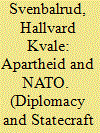

|
|
|
|
|
| Publication |
2012.
|
| Summary/Abstract |
In the 1970s, questions of apartheid and decolonisation rose to the forefront of international political debate. Building on recently declassified, multinational archival research, this analysis assesses the question of whether to impose international economic sanctions against the apartheid regime in both South Africa and white minority-ruled Rhodesia during this decade. The issue of sanctions became a strain on the relationship between Great Britain and the three Scandinavian states-Denmark, Norway, and Britain, were allies within the North Atlantic Treaty Organisation. Wary of communist influence in Africa as well as concerned about protecting their interests on the continent, the British preferred moderate measures and a long-term perspective when dealing with Southern Africa. The Scandinavian Powers, building a reputation as internationalist and progressive states and with few national interests in the area, presented themselves as leading advocates of sanctions against South Africa and Rhodesia. These differences in approach caused recurring tension between the British and their Scandinavian allies, even leading some British officials to suggest sanctioning Norway and Sweden for their Southern Africa policy. However, the end of white minority rule in Rhodesia in 1980 as well as the increasing focus on European security matters during the second Cold War of the early 1980s reduced Anglo-Scandinavian tension over Southern Africa, with the Powers continuing their close relationship throughout and beyond the Cold War.
|
|
|
|
|
|
|
|
|
|
|
|
|
|
|
|
| 2 |
ID:
116363
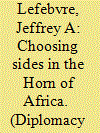

|
|
|
|
|
| Publication |
2012.
|
| Summary/Abstract |
The United States has faced at times the policy dilemma of seeing conflict erupt between two countries with which it maintains friendly diplomatic relations. The bureaucratic biases of relevant agencies can play an important role in determining whether to choose sides or remain neutral in these conflicts. In the early 1960s the Africa Bureau adopted a pro-Ethiopia bias that shaped American policy in the Horn of Africa. With the insights provided by the 2010 Wikileaks cables, this analysis explores how the "Ethiopia imperative" affected three inter-related American policy decisions in the Horn of Africa in the early twenty-first century: the decision to support Ethiopia despite its refusal to abide by a legally binding decision that favoured Eritrea following the 1998-2000 Eritrea-Ethiopia border war; to give Ethiopia what amounted to a "blank cheque" to invade Somalia in December 2006 and overthrow the Council of Islamic Courts (CIC); and to confront and isolate Eritrea diplomatically for waging proxy war against Ethiopia in Somalia.
|
|
|
|
|
|
|
|
|
|
|
|
|
|
|
|
| 3 |
ID:
116359
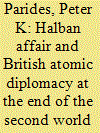

|
|
|
|
|
| Publication |
2012.
|
| Summary/Abstract |
In winter 1944, Sir John Anderson, senior minister in the government of Winston Churchill, and Wallace Akers, the chief executive officer of Imperial Chemical Industries, tried to initiate an independent and secretive atomic diplomacy that aimed to repair the Anglo-French atomic relationship. At the centre of this diplomatic debacle was a meeting in Paris between Hans Von Halban and Frédéric Joliot. Halban also travelled to Montreal at the behest of Anderson and Akers to ensure the continuation of Anglo-French atomic co-operation. Their actions not only failed to achieve their intended goal; they also brought about the unintended consequence of straining the Anglo-American atomic alliance and exacerbating France's bitterness at the Allies' refusal to invite France into their atomic alliance. This analysis is significant because it sheds light on the understudied area of British atomic diplomacy and increases the understanding of the Anglo-American "special relationship."
|
|
|
|
|
|
|
|
|
|
|
|
|
|
|
|
| 4 |
ID:
116362


|
|
|
|
|
| Publication |
2012.
|
| Summary/Abstract |
Regular meetings of heads of state and government seem, in 2012, a common feature of international affairs. About forty years ago, however, such meetings did not really exist: ad hoc summits were the rule. Comparing the emergence of the European Council in 1974 and the G7 in 1975, this article explains why and how summitry has become routine in international politics. To do so, it examines the common roots of both summits, points out the first differences between the two institutions, and, finally, underlines the common challenges they faced and the logic they shared. Taken together, these three parts underline how, despite their obvious differences, the European Council and the G7 created a new dimension of international politics.
|
|
|
|
|
|
|
|
|
|
|
|
|
|
|
|
| 5 |
ID:
116364


|
|
|
|
|
| Publication |
2012.
|
| Summary/Abstract |
This article concerns itself with the agenda, the instruments, and the goals of public diplomacy (PD). Taking into account the current state of PD that concentrates predominantly on forging cultural and educational links and promoting values, but not policies, it refocuses PD in two substantial ways: driving it, first, to focus on the most significant global issues and, second, to employ profound discursive processes. The emphasis then shifts to how PD can strengthen the global public sphere with regard to the profoundly political and critical issues of the present era. It argues in favour of strategic discursive PD and suggests ways to enhance both the legitimacy and efficiency of states' foreign policies on the handling of the Greek economic crisis and the issue of economic governance.
|
|
|
|
|
|
|
|
|
|
|
|
|
|
|
|
| 6 |
ID:
116360
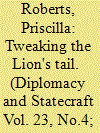

|
|
|
|
|
| Publication |
2012.
|
| Summary/Abstract |
In its first 2 decades the Canadian Institute of International Affairs (CIIA), Canada's premier foreign policy think tank, never functioned merely as a neutral and apolitical research organization. Under the leadership of Edgar Tarr, president of the Monarch Life Assurance Company, and in its capacity as the Canadian Council of the transnational Institute of Pacific Relations (IPR), in the 1930s and 1940s the CIIA became an instrument that championed Canadian national autonomy and sought to expand Canada's international role, while challenging British imperialism, racism, and Anglo-Saxon dominance. Prominent Canadian diplomats and other officials were complicit in this enterprise, which reached its apogee at the IPR conference held at Mont Tremblant, Quebec, in December 1942. The CIIA's activities during this period revealed the porosity and imprecision of the boundaries in Canada between the state and non-state realms. Throughout World War II, DEA and other Canadian government representatives attended CIIA and IPR conferences as "official non-officials," effectively cooperating with private individuals in a network of purportedly non-governmental organizations that enabled Canada to exert leverage on the British government, reject British leadership, align itself with the United States, and secure a greater world role. CIIA leaders and Canadian officials also consciously encouraged nationalist forces in India, China, and Southeast Asia that sought to reject colonial rule and Western dominance. CIIA activities thus became part of a web of diplomatic interactions across a transnational network of think tanks within and outside the British Empire that had their own impact upon international affairs.
|
|
|
|
|
|
|
|
|
|
|
|
|
|
|
|
| 7 |
ID:
116361
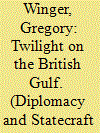

|
|
|
|
|
| Publication |
2012.
|
| Summary/Abstract |
The 1961 Kuwait crisis stands as a key event in the evolution of American strategic thinking on the Persian Gulf. Following Iraqi threats to annex Kuwait, Britain despatched a sizable military force to the Emirate hoping to pre-empt an Iraqi invasion. When the Iraqi invasion failed to occur, Britain was forced to weather a political maelstrom as it struggled to withdraw its forces. Although the United States was largely an observer to the crisis, London's actions required Washington to acknowledge the limits of Britain to meet the political challenges of the Middle East and protect Western interests in the region. This realisation provided the impetus for Washington to diversify its strategy in the Persian Gulf and increasingly seek regional solutions for its security concerns.
|
|
|
|
|
|
|
|
|
|
|
|
|
|
|
|
|
|
|
|
|